#snk extra pages
Text
there’s been a super specific “leak” from a seemingly reliable leaker of “attack on titan volume 35” aka a release of the final volume 34, with “18 extra pages” in the final chapter.
leaked image
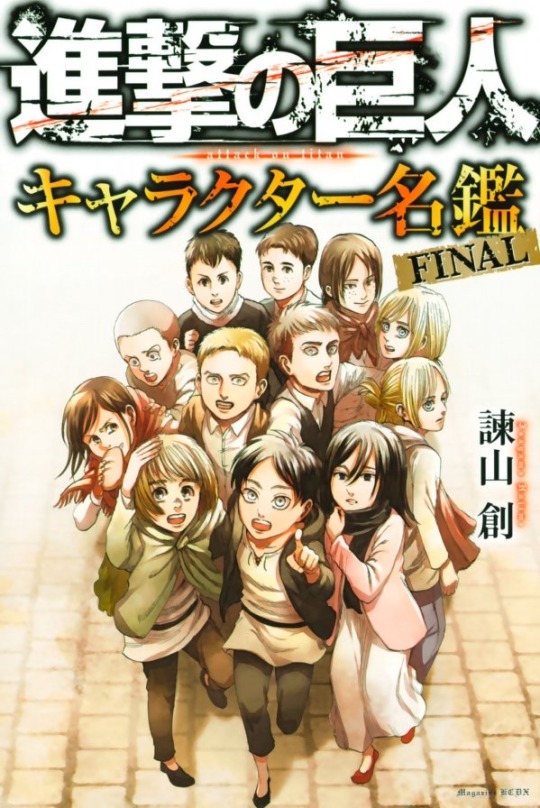
also shingeki fly is an “Illustration Artbook”, 200 pages.
leaked image
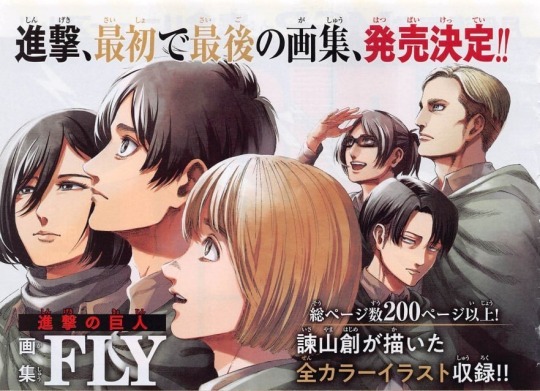
both to be released april 30th next year.
two verified accounts have reported it but you know that verification means like nothing on twitter these days, but i don’t think it has no merit.
isayama said this in february this year
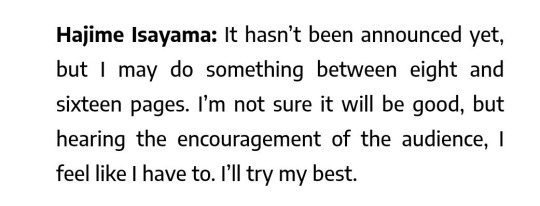
#i’m gonna be a skeptic until aot wiki says something💔#we already got a ch139 re release with extra pages so….. ❓#n e way someone said that isayama has fallen victim to the evangelion curse😭😭#attack on titan#snk#aot news#aot final season#to be deleted#maybe
35 notes
·
View notes
Text
0 notes
Text
SNK 139.5: Towards the Final Pages with no Final Answers
The final pages of the updated ending are bold, but I think ultimately more evocative than the original preliminary ending.
Even after the intensely polarized reader reception that took issue with the lack of storytelling precision and clarity when it was most needed, SNK chose to end with a decisively ambiguous symbol. In literature, a symbol is something that clearly means something -- but with the most "literary" symbols, their meaning cannot be absolutely defined; any attempted answer as to what a symbol represents has no finality or certainty, and interpretation will remain ever open to debate. A symbol both invites and resists interpretation.
Naturally, the immediate response to the symbolic tree on the final page is to try answering the invitation to the question, "What does it mean?"
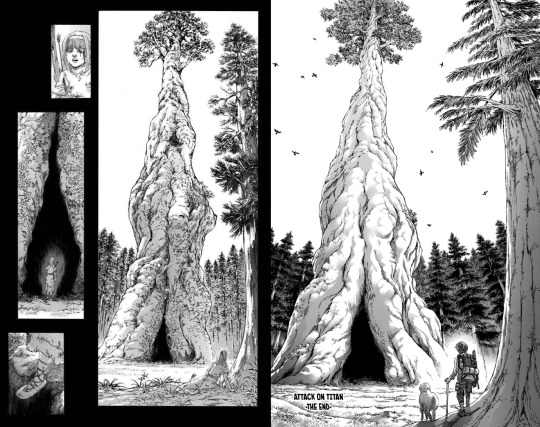
One prominent answer I've seen is that it symbolizes the continuation of the cycle of war and violence either because a) of the symbolic parallel to Ymir or b) on a more literal level, that it implies the actual potential revival of new era of Titans. A reasonable interpretation either way, but also, I think, an incomplete one.
The first reason for this is that "the endless cycle of war" was already clearly and powerful represented in the preceding panels:
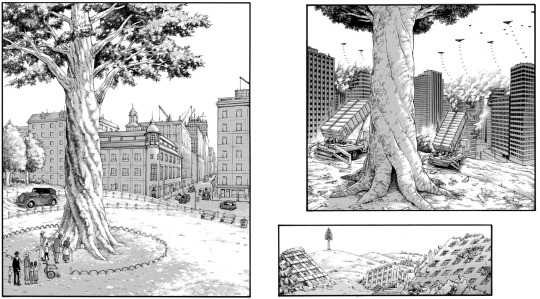
The cycle of war was already continuing in the decades or centuries before the child arrived at the tree. A culminating image symbolizing the persistence or resurgence of an era of war as the final panel would thus arguably be redundant and unnecessary.
Furthermore, the chapter is entitled "Toward the Tree on That Hill." If the tree were simply a symbol of war, by implication the chapter could equally be called 'toward the endless cycle of war'. But such a relentlessly bleak and tonally flat ending sentiment would be firmly incongruous with the story's recurrent conviction in the equal cruelty and beauty of the world -- a conviction that I believe it has been faithful to all the way to its end.
The Long Defeat
But while on this topic of war, let's linger a moment on the "cruelty" side and the consequence of this wordless construction and subsequent destruction of a city -- the most bold and possibly controversial additional panels that are also my personal favourite additions.
One objection that has emerged against this brief sequence of Paradis' apparent destruction is that it renders the entire story to be "pointless". Eren's 80% Rumbling, Armin's diplomatic peace talks between the remnants of the Allied Nations and Paradis, and before that, the proposal of the 50-year plan and Zeke's euthanasia plan... everything, to the very beginning to the Survey Corps' dreams of some kind of freedom; was it all for nothing? All that striving, that hope, that final promise bestowed upon Armin: was it all a pointless story? Even more radically, is the story suggesting that Eren might as well have continued the Rumbling to 100% of the earth? Was Zeke's euthanasia plan the cruel but correct choice all along? What was the point of rejecting the 50-year plan if that had a greater chance of success at preventing this outcome?

I think Isayama suddenly pulling back to such a long-term view of history to the scale of decades or even centuries into the future calls for a reorientation in attitude towards exactly what kind of story we have been reading. Yes, if the metric is Paradis' survival, maybe it was indeed all "pointless". But that's also to say that, on the broadest scale, SNK is a story about futility, that it is a deliberate representation of the struggle to make one's actions historically meaningful.
In the long view of history, all the events, from Grisha running beyond the wall to see the airships and the first breaking of Wall Maria to Erwin's sacrifices, Paradis' discovery of the outside world, and finally to the Battle of Heaven and Earth, it would all merely be a handful of chapters in the history textbooks of the future. A future in which war and geopolitical conflict will continue even without Titans. That does not mean that all paths to the future are equal -- the 50-year plan would not have put an end to Titans, and Zeke's euthanasia plan distorts utilitarian ethics into just another form of oppression; there are better and worse decisions that lead to more and less degrees of suffering, but no decision can ever be the final one.
The additional panels remind us that in history, there never exists a singular "Final Solution". The reason there are readers who vehemently support Eren to have flattened 100% of the world, and the reason the Paradisians supported the oppressive, authoritarian, proto-fascist Jaegar Faction under Floch and even after the Rumbling, is that because they want to believe that a Final Solution to end conflict exists and will work. They resist the fundamental uncertainty and complexity of the situation, instead preferring a singular, unified, and coherent Answer to Paradis' struggle to survive. I'm reminded of the scholar Erich Auerbach's theorization of why fascism appealed to many people during periods of political and social crisis, change, and uncertainty. Writing in exile after fleeing Nazi Germany, he observed that:
"The temptation to entrust oneself to a sect which solved all problems with a single formula, whose power of suggestion imposed solidarity, and which ostracized everything which would not fit in and submit - this temptation was so great that, with many people, fascism hardly had to employ force when the time came for it to spread through the countries of old European culture." (from Mimesis p. 550)
This acutely describes the Jaegar Faction's rise to power and continued dominance in Paradis. But their promise of unity, of a single formula to wipe out the rest of the world either literally through the Rumbling, or to dominate them with military force, is a false one. Even if Eren had Rumbled 100% of the world instead of 80%, history would still go on. The external threat of the world may have been eliminated, but internal conflict and violence would still continue onward throughout the generations born on top of the blood of the rest of the world. Needless to say, out of all the options, Eren's 80% Rumbling is the very epitome of perpetuating the cycle of violence as it creates tens of thousands of war orphans like Eren once was, and it would justify employing violence for one's own self-interest to an extreme degree. For the generations to come that would valourize Eren as a hero, it would set a dangerous precedent for what degree of destruction is acceptable for self-defence -- nothing short of the attempt to flatten the entire world. It is no surprise that Paradis would meet a violent end when its founding one-party rule of the Jaegar Faction has their roots in such unapologetically bloody foundations.
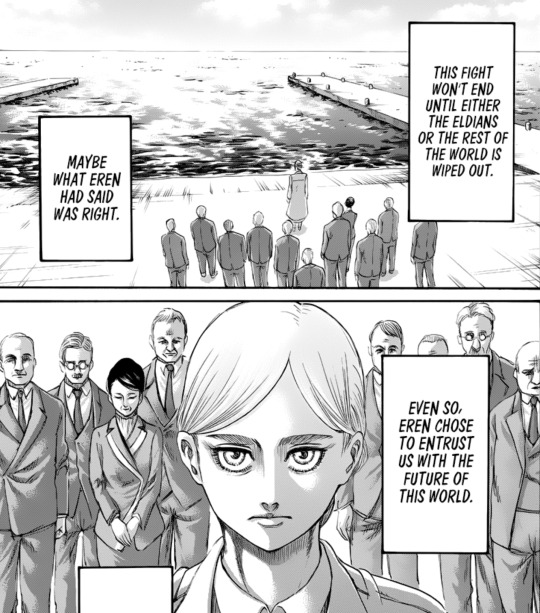
Neither the 80% Rumbling nor the militaristic, ultra-nationalistic Jaegar faction that come to govern Paradis are glamourized as the "correct" solution to ensuring Paradis' future. (This can also put to rest any accusations of SNK's ending as "fascist" or "imperialist" propaganda, since the island's modern nation that they founded ends in war. All nations must fall eventually, but not all do in such blatant destruction). Importantly, neither is Armin's diplomatic mission naively idealized as that which permanently achieves world peace. No singular or unifying formula can work because reality is complicated. Entrusting oneself to seemingly simple Answers is simply insufficient, even if they are ideals of peaceful negotiation; that method may work given the right conditions, but the world will always eventually complicate its feasibility.
After all in the real world, there's the absurd irony that some in the West had called the First World War "The War to End all Wars". These days, WWI is merely one long chapter in our textbooks just a few pages away from the even longer chapter of the Second World War that is followed by all the rest of the conflicts that have followed since then even with the establishment of diplomatic organizations like the United Nations. In this sense, showing Paradis' eventual downfall is perhaps the only way to end such a series that is so concerned with history, from King Fritz's tribal expansion into empire, the rise and fall of Marleyan ascendency, and finally of the survival and apparent shattering of Paradis.
From its beginning to its end, SNK has poignantly evoked J.R.R. Tolkien's conception of history as The Long Defeat. In one character's words, "together through ages of the world we have fought the long defeat". That is to say, "no victory is complete, that evil rises again, and that even victory brings loss".
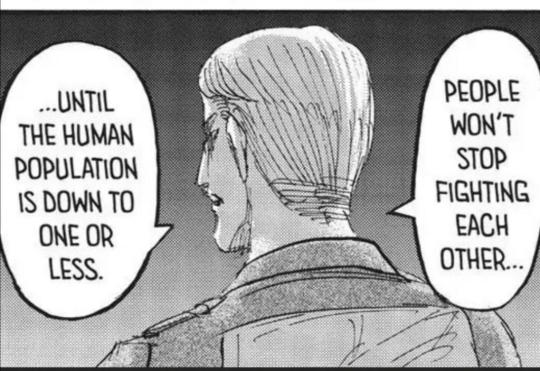
No heroes, only humans
Eren's desperate, fatalistic resignation to committing the Rumbling, along with the characters' rejection of all the rest of the earlier plans to ensure Paradis a future, are merely the actions of human beings to that began with the need to find not even necessarily a Final Answer, but at least an acceptable and feasible one for the time being. But the characterization of Eren's confusion, childishness, and regret in the final chapter is startlingly real in how it demonstrates how, all along, we have been dealing not with grand heroes, but simply people who have no answers at all. SNK has always been about failures - and often ironic failures; it has always been a story about painful and frequently futile struggle.
People make mistakes, they can be short-sighted, selfish, biased, immature, petty, and irrational, and I think the ending follows through with depicting the consequences of that.

Erwin's self-sacrifice before being able to reach the basement (and his regression to a childhood state in the moments before his death), Kenny's futile chasing after that universal compassion he had seen in Uri, Shadis never being acknowledged by history despite his final heroic action, and so on -- these stories of ironic, futile failures are still meaningful in their mere striving. Eren's ending and Paradis' demise despite Armin's endeavour to ensure them a peaceful future are entirely consistent with this.
SNK certainly follows the shounen trope in which young individuals are bestowed great power and correspondingly great responsibility, and must then reconcile the burden of possessing that greatness on which the fate of the world depends. Yet it is equally defined by its representation of the state that us normal human beings confront everyday: the struggle against the apparent powerlessness to enact any meaningful or lasting change at all. Simultaneously, this helpless state does not exempt us from the responsibility to act in whatever small capacity we are able to resist oppression, ideological extremism, and the perpetuation of violence.
Towards That Symbol
That was a rather long but vital digression about the additional "construction and destruction" pages. To return to the issue of the symbolism in the final panel, here I will turn from seemingly affirming the tree as symbolizing the cycle of violence, towards what I think is the greater complexity of what the tree might "actually" symbolize.
As I've said above, I don't believe that the final chapter title is synonymous with 'toward the endless cycle of war'. In tone, theme, and characterization, SNK has always been defined by the tension between cruelty and beauty, the will to violence and the underlying desire for peace, and the rest of the contradictory impulses that all simultaneously coexist. The end of SNK as a whole commits to a similar lack of closure, ambiguity, and interpretive openness.
So far I have rambled on about only a view of the perpetual "cruelty" of history. Where, then, is the "beauty"?
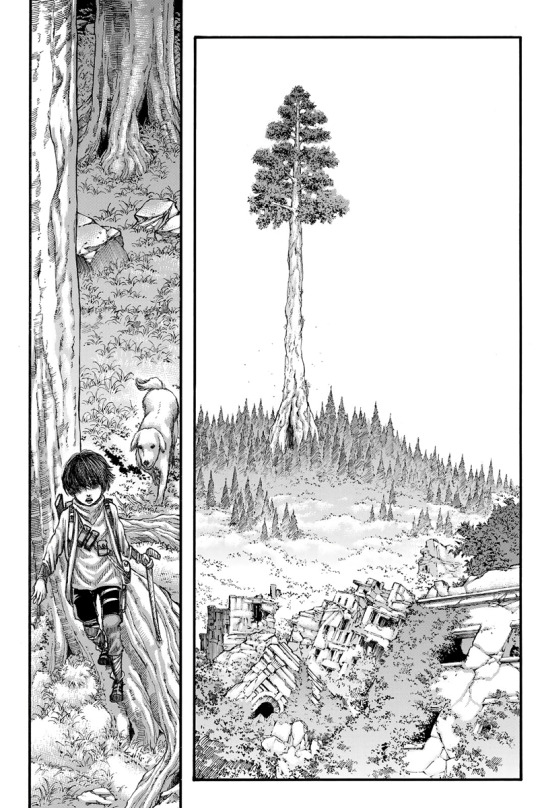
In short, the "tree = cycle of violence" interpretation is obviously based on how that this tree recalls the original tree in which the spine creature, as the source of the power of the Titans, resided. But it's worth first considering, what exactly is this creature? We seem to get our answer in the chapter that most precisely crystallizes the dual "cruelty and beauty" of the world:
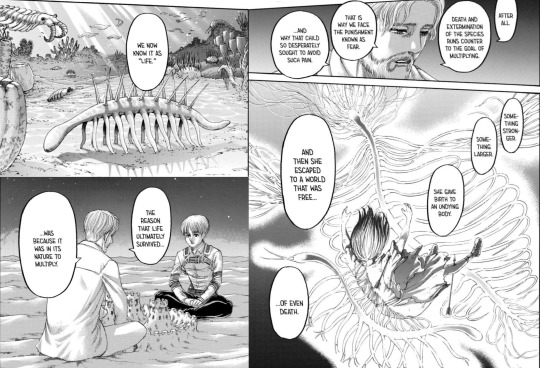
The spine creature might be said to be life itself. Or more specifically, the will of life to perpetuate itself, for no reason at all but for the fleeting moments in which we feel distinctly glad to have existed in the world.
The creature at the source of the Titans, and in extension the Titans themselves, is neither inherently a positive or negative, "good" or "evil", creative or destructive force. It's both and all of those at once. As with any power, the Titans were merely a tool that was put to use to oppressive ends.
So as I now suggest that the tree at the end is symbolically a "Tree of Life", I don't at all mean "life" in the typically celebratory or optimistic sense: rather, I mean it in the ambiguous, ambivalent, uncertain, and complex sense that has been evoked throughout the above discussion of the inevitable continuation of war.
The title "Toward The Tree on That Hill" is derived from its associations with Eren and Mikasa, but more specifically of course, from Armin's affirmation of existence. However, the tree as a symbol of existential affirmation is undercut with the revelation that, despite Armin's diplomatic mediation between the Allied Nations and Paradis, the island nation never escapes war just as no nation in the history of the earth has ever fully escaped war.

The image of Armin running toward that life-affirming tree by the end becomes twisted and complicated, as the image of the anonymous child approaching the Tree of Life evokes both awe at its beauty and grandeur, and a deep dread at the foreboding of its cyclical return to Ymir's tree that signalled the beginning of a bloody era.
And I think that is precisely it: Life is not some idealized, beautiful vision that we always want to run toward; it is also ironic, complicated, and dreadful. It is ambivalent. Like a literary symbol, the meaning of life cannot be pinned down absolutely. The tree therefore becomes itself a symbol of uncertainty, of an open future that is cyclical both in its beauty and war.
As a final observation, it is surely no coincidence that, the small, black, birdlike silhouettes of the war planes destroying the city from the sky is replaced by the similarly small black silhouettes of birds in the final panel.
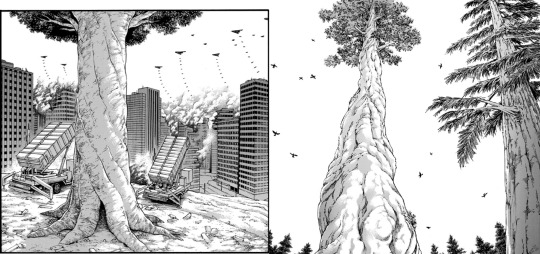
If the birds represent freedom from war, the irony is that the immediately surrounding land appears to be one completely empty of people save for the exploring child; it is a freedom attained only without people's presence. Yet at the same time, a child from some existing civilization has reached it; perhaps it is freedom that they have reached, perhaps it is something else that they see in the tree. What is it that they were looking for? What does the tree and its history represent for the child, and what does it mean for their future? Alternatively, does the child-in-the-forest imagery negatively recall the warning that the world is one huge forest of predator and prey that we need to protect children from entering?
Rather than providing answers, this tree embodies all of the potential questions, and all of the potential answers. These possibilities will unfold themselves into an uncertain future beyond the chapters of history that Eren, Armin, Mikasa, Zeke, Erwin, and all the rest of the characters were part of and left their mark on; and whatever future this child will witness or create, it will similarly be one of the struggle against futility, as the journey begins anew with each generation in every new era. Neither - or both - hopeful or despairing, the final image of this tree, just like life itself, contains those innumerable irresolvable tensions as it gestures towards all possibilities, both oppressive and free.
#snk 139#snk ending#snk extra pages#snk meta#snk#snk spoilers#brain dump#this is a pretty personal interpretation so if there are any logical inconsistencies i don't know what to do with them#yes the execution of the final arc/chapter is flawed but it's still very conceptually interesting#i still have my disappointments but overall i've made my peace with it#translating my tangled thoughts into words however imperfectly: i think that's what freedom is all about#snk manga#aot#aot 139#aot ending
232 notes
·
View notes
Text
On the Extra Pages
Paradis and War
We see Paradis being bombed, but bombing is not necessarily equal to destruction, and just because one city is wiped out doesn’t mean every city was, as horrible as that one city’s loss is. In fact, the story itself seems to subtly offer a hint that Paradis was not entirely destroyed, or at the very least not wiped out in a genocide, because the child looks to be a descendant of Mikasa. It’s ambiguous so people can choose what to believe about this, though.
Personally, I think it’s a good choice to show that Eren’s genocide did not in fact bring a forever peace. However, the war looks to be after Mikasa’s death as a very old lady, so hence we can conclude most of our cast lived good lives. Maybe the war was a result of Jaegerism and the genocide; maybe it was something else entirely, like the crystal resources. It is a cycle, war and peace, and neither are completely gone--because after the war comes a peaceful scene of a child trotting around and playing.
On the Titan Curse
So the spoilers said the curse still exists, but we do not see that. Yes, it is true that the tree opening looks like the opening Ymir fell into an d received the titan curse from the... spine creature, for lack of a better name/term. However, we simply don’t know this is the case for sure, and we don’t know what the child will decide to do should they inherit anything. Remember, technology has also advanced, so even if they ended up cursed, they wouldn’t have to immediately be cosigned to a short life, and their choices mean they are not doomed to create other titans like Ymir.
If we think of the spiny creature as evil in the world, evil born out of power, people will always encounter it. It’s part of human life on earth. But we have choices about what to do with it. Ymir was a slave who had no choice about what to do with it. Presumably, this kid, as a descendant of Mikasa’s, might well be able to choose differently if they even take the power and if the power is even there.
On Jeankasa
I agree entirely with @momtaku‘s analysis that this is a very Jack and Rose story, wherein Eren and Mikasa are Jack and Rose, and Jean is Rose’s unnamed husband. (I’ve actually been comparing Eremika to Jack/Rose for months now even before the ending came out.)
Eren and Mikasa are the main love story of SnK. We have Jean also loving Mikasa, and that it seems to imply they ended up together is a good conclusion. However, his face is never shown, so people can conclude it isn’t Jean if they don’t want it to be; however again, the authorial intent is pretty clear that this is Jean, but it’s also left a little bit up to people’s imagination and people can think what they like.
For Eremikas... Mikasa finding love again seems consistent with her personality to me, but I get that some people would have wanted her not to. To me it reminds me of Katniss having kids at the end of The Hunger Games, wherein it seemed to me like the obvious choice for her personality and arc, but having it confirmed was upsetting for fans who wanted something else, and that want is not inherently wrong.
But it’s also worth remembering that Mikasa and Jean and their kids, and her grandkids, are shown visiting Eren’s grave her entire life. She never “moved on” from Eren. She found a new love, and that new love (Jean) supported her love for Eren, and probably loved her devotion to him. One love does not replace the other because love is not a finite resource. She can be committed to both for life because Eren is dead; love is not limited by death in the same way as loving commitments are limited by life (and they are); love transcends death and life. It’s something many who lose a spouse IRL experience, as I’ve written before. Her grandkids helping her lower the rose to his grave implies that they know all about him, too.
Imo, the ending is, as Momtaku says, a win for Eremika as much as it is for Jeankasa. Sip your champagne, fine people.
Moving Forward
I love the ending. The final pages I actually like as well. I think critique is very valid and I get that people are not happy about different elements, but I don’t want further asks requesting validation for not liking an aspect (you are valid, you don’t even need any reason for it), or asks demonizing Jean or Isayama himself, and I especially do not want asks implying Eren was justified after all just because there was more war (if anything, it thematically implies the opposite). I’ve gotten hundreds of these asks, and I’m really stretched thin right now and tired. I love getting asks, but sometimes these asks can be emotionally exhausting, and I am only human. Asks about what I thought of a particular aspect, asking about a critique you’re genuinely curious about (not one you just need validation for an opinion of), etc are still very much welcome, but any asks like the above will not be answered.
173 notes
·
View notes
Text
I feel like the biggest problem with Attack on Titan at the moment is that there seems to be a huge disconnect between what the creators think the fan's don't like about the ending and what the fans actually don't like about the ending.
They said they saw the fan response to 139 and hoped that the additional pages would help people accept the ending. But if they actually looked at what the fan response was, the would have noticed two things:
1. 8 additional pages was never going to fix the ending for the people who didn't like it.
2. The contents of the additional pages (if the leaks are true) would actually make the ending worse for a lot of people, which it did.
I just look at what has happened over the last few months and wonder how any of this is meant to fix anything.
I know they are trying, and I don't want to discredit that, but they don't seem to understand the fan's very well if they think that any of this is making the situation better...
20 notes
·
View notes
Text
I get you guys don’t like the leaks for snk 139 extra time pages that’s fine. You’re entitled to your opinion, but for once can I go on the eremika tag and see some leaks for the rom com. Snk is over get over it, that rom com is fresh material can we talk about that!
14 notes
·
View notes
Text
“For even if I'm far away, I hold you in my heart...”

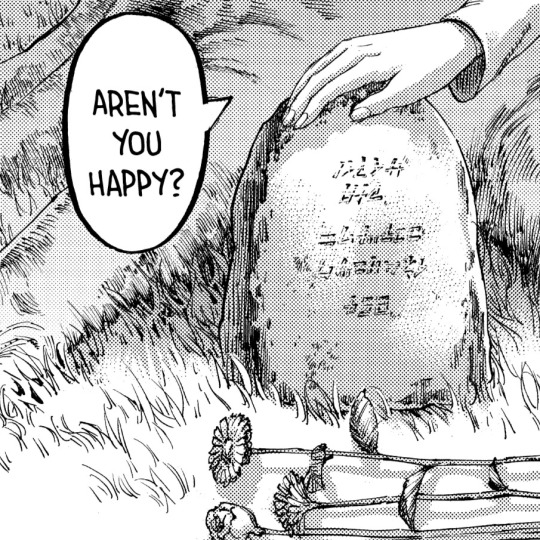

Free thoughts on the extra pages! Am I crying all over again? No? Try again.
My heart aches to see that even after all the years that have passed, Mikasa still remembers Eren.
Ageing damages the memory.
I wonder how she remembers Eren.
Is it like a detailed narrative or a blurred vision of him?

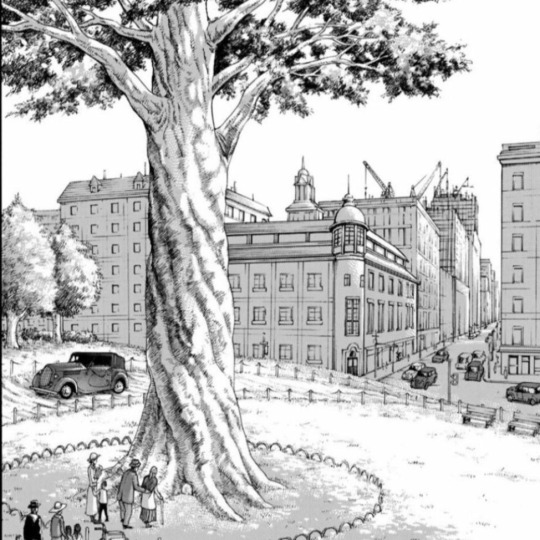
Paradis aerial bombing probably occur couple of decades or three after Mikasa's death. (notice how much the infrastructures have changed)
Eren didn't fail on his mission.
^ from my personal standpoint.
He saved Armin and Mikasa, gave freedom to his island, and created a place where his loved ones will be able to live happy lives.
It wasn't because the rumbling failed that all of those are happening to Paradis.
War is rooted not on the titan's but on humanity's greed.
It wasn't Eren who failed but those who came after him, their greed.

This final panel confirms it all.
War is a neverending cycle of greed and hatred, there will always be that one who's gonna come and ignite the fuse.
I'm not necessarily saying that 'that one' is Beren.
I see this panel as something that represents 'that cycle'.
ps.
can u imagine if like, Beren touches the parasite and then we're back to chapter 1 where Eren wakes up, like, LSBIDS that's kinda morbid but idk, it sounds cool.
#i can't go on without singing remember me from coco lmao#mama coco reminds me of old mikasa trying to remember Eren#shingeki no kyojin#attack on titan#mikasa ackerman#armin arlert#eren jeager#aot 139#aot spoilers#aot 139 extra pages#aot#snk#snk 139#paradis#attack on titan spoilers#EMA
88 notes
·
View notes
Text
This is just me trying to make sense of how the chapter title of 139 is connected to the extra pages so this might come off as more of a stream of consciousness than an organized post.


The first thing I noted was that the tree is constantly growing admist the growth/development of Eldia and its subsequent fall and destruction. I'm not sure whether there's any intent behind it, but from what we know this is the site where Eren was buried and it may be interpreted as the fruits of Eren's actions being displayed. In the first panel the leaves are barely covering the tree and it may be seen as the long lives of Eren's friends being the first fruits of his actions. They all live long lives with their families and grow to old age all the while keeping him in their hearts as exemplified with Mikasa.
Next, we see War in Heaven sorry I couldn't resist it. The tree grows a bit more and the seeds of Eren's actions are shown more exhaustively. His actions have brought about war, a continuation of the cycle and ultimately, Paradis' destruction. All the good has faded away and the development has crumbled. The Eternal Return, Moira, Ananke, Fate and the Cycle are bound to the world. It almost serves to validate Reiner in 117 and Zeke from 137. Striving is futile, and despite the efforts of Eren and the Alliance, this is the destiny of the world.



Then there are the final pages.


I think there's something quite hopeful about them. Despite the fact that the story ends with the grievance of a child wandering in the forest, seemingly destined to repeat the titanic tragedy from the ages before, there's also a sort of hope.

This child doesn't seem injured or depraved like Ymir was, he seems curious and almost in awe. And I think this rekindled the spirit with which the Survey Corps faces the cruelty of the world. If we don't know we'll see, if they don't know us, we'll show ourselves to them.


So though things are left slightly ambiguous, the parallel to Ymir serves to show us that this boy's Will will shape the new age, our will in the face of cruelty will shape the direction of the world. So as Nicolo said, though this devil may lie within the heart of humanity, we still need to strive our hardest to leave this forest of our making.
#attack on titan#eren jaeger#shingeki no kyojin#eren yeager#snk meta#snk ending#i really liked the extra pages#they manage to balance hope with darkness quite well#in a way that's characteristic of this series
31 notes
·
View notes
Text




Attack on Titan Shippuden, when? I guess we’ll pull a Full Metal Alchemist, when the dog goes in the tree with the kid.
#attack on titan#snk leaks#aot 139#jean kirstein#mikasa aot#aot extra pages#what the fuck is that generic cycle of hatred bs
56 notes
·
View notes
Text
Does this sound crazy or was SNK 139 not that bad in hindsight? i can't say for sure because my brain has melted:

#These extra pages seriously fried my brain trying to make sense of it#it does not compute#my brain like error code this is dogsh*t#snk spoilers#snk leaks#snk ending#snk 139#mikasa ackerman#levi ackerman#eren jaeger#rivamika#erehisu#jeankasa#ereri#eruri#levihan#eremika
49 notes
·
View notes
Text


i feel so empty I WISH I DIDNT FEEL SO EMPTY
#of course this is my OPINION#but i dont like the extra pages#cant a story end open-ended and still feel like the end of a story should? fulfilling rewarding#even a tragic end should all in all feel that way#but it rly feels like.... we followed these characters and their lives and rooted for their beliefs and fights.. for nothing#idk.#i rly do understand what its supposed to mean thematically#but the narrative feels like it just died with a whimper#IDK.#ugh some more closure wouldve been nice#IDKKKKK#kane reads#aot#aot spoilers#snk spoilers
17 notes
·
View notes
Text


🎼 With Jake the 🐶 and Finn the👱, the fun never ends-

#snk#snk leaks#snk 139 extra pages#attack on titan spoilers#shingeki no kyojin spoilers#snk spoilers#spoilers#attack on titan#aot#aot spoilers#snk 139#shingeki no kyojin#aot 139
50 notes
·
View notes
Text
At the end, Hajime Isayama killed everyone of the main characters one way or another lol.

ISAYAMA GOAT
#I want to know what happened with Reiner Levi and Armin#But I doubt Isayama show us all of them in the extra pages#shingeki no kyojin#snk spoilers#attack on titan#levi ackerman#hange zoe#eren jagear#Mikasa Ackerman#Armin Arlert#AoT spoilers
45 notes
·
View notes
Photo

It’s more conclusive than before for sure, but I’m not sure about how it all adds up with what our protag has been trying to accomplish.
#aot#aot manga#aot extra pages#aot139#aot memes#attack on titan#snk#snk manga#shingeki no kyojin#snk memes#manga#snk spoilers#aot spoilers#eren jaeger#eren yeager#mikasa aot#mikasa ackerman#aotfeed#snk139
34 notes
·
View notes
Text
COPING on 3...2....

#attack on titan#shingeki no kyojin#snk#snk manga#aot#snk spoilers#mikasa ackerman#snk 139#aot 139#shingeki manga 139#extra pages#jean kirstein#the dream on 127 was real#lol#poor Ereh
33 notes
·
View notes
Text
Eren went from being a bird to a fucking tree in a matter of pages
#attack on titan#aot#snk#shingeki no kyojin#aot 139 spoilers#aot extra pages spoilers#eren yeager#eren jaeger
24 notes
·
View notes